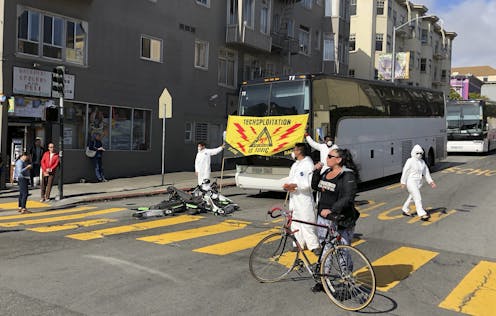Silicon Valley, from 'heart’s delight' to toxic wasteland
Big technology firms are becoming known for mistreating workers, customers and society as a whole. Is an economic powerhouse about to collapse like Detroit did years go?

There was a time when California’s Santa Clara Valley, bucolic home to orchards and vineyards, was known as “the valley of heart’s delight.” The same area was later dubbed “Silicon Valley,” shorthand for the high-tech combination of creativity, capital and California cool. However, a backlash is now well underway – even from the loyal gadget-reviewing press. Silicon Valley increasingly conjures something very different: exploitation, excess, and elitist detachment.
Today there are 23 active Superfund toxic waste cleanup sites in Santa Clara County, California. Its culture is equally unhealthy: Think of the Gamergate misogynist harassment campaigns, the entitled “tech bros” and rampant sexism and racism in Silicon Valley firms. These same companies demean the online public with privacy breaches and unauthorized sharing of users’ data. Thanks to the companies’ influences, it’s extremely expensive to live in the area. And transportation is so clogged that there are special buses bringing tech-sector workers to and from their jobs. Some critics even perceive threats to democracy itself.
In a word, Silicon Valley has become toxic.
Silicon Valley’s rise is well documented, but the backlash against its distinctive culture and unscrupulous corporations hints at an imminent twist in its fate. As historians of technology and industry, we find it helpful to step back from the breathless champions and critics of Silicon Valley and think about the long term. The rise and fall of another American economic powerhouse – Detroit – can help explain how regional reputations change over time.
The rise and fall of Detroit
The city of Detroit became a famous node of industrial capitalism thanks to the pioneers of the automotive age. Men such as Henry Ford, Horace and John Dodge, and William Durant cultivated Detroit’s image as a center of technical novelty in the early 20th century.
The very name “Detroit” soon became a metonym for the industrial might of the American automotive industry and the source of American military power. General Motors President Charles E. Wilson’s remark, “For years I thought what was good for our country was good for General Motors, and vice versa,” was an arrogant but accurate account of Detroit’s place at the heart of American prosperity and global leadership.
The public’s view changed after the 1950s. The auto industry’s leading firms slid into bloated bureaucratic rigidity and lost ground to foreign competitors. By the 1980s, Detroit was the image of blown-out, depopulated post-industrialism.
In retrospect – and perhaps as a cautionary tale for Silicon Valley – the moral decline of Detroit’s elite was evident long before its economic decline. Henry Ford became famous in the pre-war era for the cars and trucks that carried his name, but he was also an anti-Semite, proto-fascist and notorious enemy of organized labor. Detroit also was the source of defective and deadly products that Ralph Nader criticized in 1965 as “unsafe at any speed.” Residents of the region now bear the costs of its amoral industrial past, beset with high unemployment and poisonous drinking water.
A new chapter for Silicon Valley
If the story of Detroit can be simplified as industrial prowess and national prestige, followed by moral and economic decay, what does that say about Silicon Valley? The term “Silicon Valley” first appeared in print in the early 1970s and gained widespread use throughout the decade. It combined both place and activity. The Santa Clara Valley, a relatively small area south of the San Francisco Bay, home to San Jose and a few other small cities, was the base for a computing revolution based on silicon chips. Companies and workers flocked to the Bay Area, seeking a pleasant climate, beautiful surroundings and affordable land.
By the 1980s, venture capitalists and companies in the Valley had mastered the silicon arts and were getting filthy, stinking rich. This was when “Silicon Valley” became shorthand for an industrial cluster where universities, entrepreneurs and capital markets fueled technology-based economic development. Journalists fawned over successful companies like Intel, Cisco and Google, and analysts filled shelves with books and reports about how other regions could become the “next Silicon Valley.”
Many concluded that its culture set it apart. Boosters and publications like Wired magazine celebrated the combination of the Bay Area hippie legacy with the libertarian individualism embodied by the late Grateful Dead lyricist John Perry Barlow. The libertarian myth masked some crucial elements of Silicon Valley’s success – especially public funds dispersed through the U.S. Defense Department and Stanford University.
In retrospect, perhaps that ever-expanding gap between Californian dreams and American realities led to the undoing of Silicon Valley. Its detachment from the lives and concerns of ordinary Americans can be seen today in the unhinged Twitter rants of automaker Elon Musk, the extreme politics of PayPal co-founder Peter Thiel, and the fatuous dreams of immortality of Google’s vitamin-popping director of engineering, Ray Kurzweil. Silicon Valley’s moral decline has never been clearer, and it now struggles to survive the toxic mess it has created.
The authors do not work for, consult, own shares in or receive funding from any company or organization that would benefit from this article, and have disclosed no relevant affiliations beyond their academic appointment.
Read These Next
After a 32-hour shift in Pittsburgh, I realized EMTs should be napping on the job
A paramedic and university professor shares data about how strategic napping could help his own health…
How Dracula became a red-hot lover
Count Dracula was originally a rank-breathed predator. His transformation into a tragic romantic mirrors…
Menstrual pads and tampons can contain toxic substances – here’s what to know about this emerging he
Heavy metals, phthalates and other potentially harmful chemicals have been detected in a range of menstrual…






